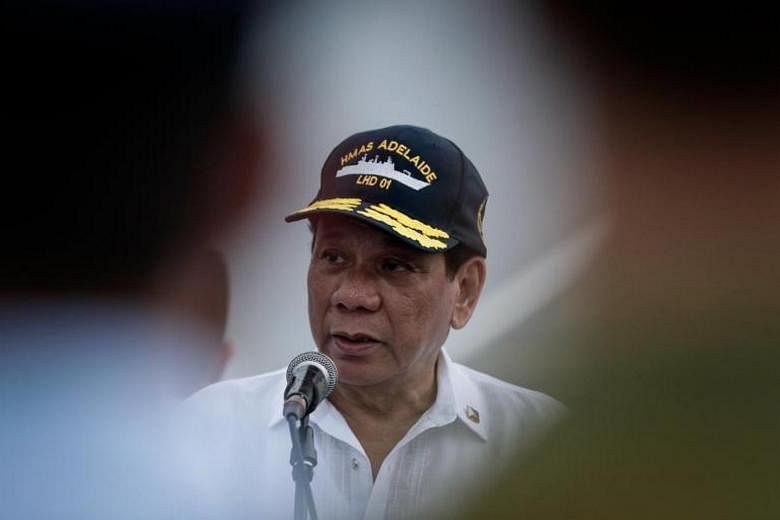MANILA (REUTERS) - Philippine President Rodrigo Duterte said on Thursday (Oct 12) he hoped a shift to target big networks in his war on drugs would satisfy "bleeding hearts" and interfering Western states fixated on the high death toll in his brutal crackdown.
In a televised speech, Mr Duterte read a memorandum that removes police from the drugs war and places the Philippine Drug Enforcement Agency (PDEA) in charge, then launched a curse-laden tirade at foreign critics of a campaign that has killed thousands of Filipinos.
Mr Duterte took aim at a group of European parliamentarians and civil society groups, some of whom this week reportedly warned the Philippines risked losing trade privileges because of unchecked abuses by police during his signature campaign.
"I am not interested anymore in using any other (agency), just let PDEA," he said.
"They seem to want it, I want, as a last word, maybe this would suffice for the stupid European Union guys. They were all focused on how many deaths."
It was unclear whether the decision to change tactics was influenced by Western pressure.
The administration on Thursday said the shift was to target "big fish", moving away from street level operations to go after big networks and suppliers.
Police disbanded all 18 regional anti-drugs units on Thursday. Presidential spokesman Ernesto Abella said the new aim was for the PDEA to target "higher echelons of the syndicates, as well as their protectors in government".
That message will sound familiar, with similar announcements a year ago when a new phase of the drugs war was launched to catch producers and suppliers.
Critics say that never happened and small-time dealers and users and the urban poor continued to bear the brunt of the 3,900 killings by police. Police say armed suspects resisted arrest in every one of those cases and they deny allegations victims were executed.
Mr Duterte was furious on Thursday and appeared to suggest the European lawmakers had warned the Philippines could lose its UN membership.
Mr Duterte lashed out at Western powers who colonised countries, started wars, "stole" oil from the Middle East, and said they had import terrorism to their own shores.
He dared them to cut ties with the Philippines and have their ambassadors leave within 24 hours. He said his new alliances with Russia and China - UN Security Council permanent members - would keep the Philippines in the United Nations.
"We will be excluded in the UN? You son of a bitch. Go ahead. You are interfering in our affairs because we are poor. You give money and then you start to orchestrate what things should be done," he said.
"You bulls**t. We are past the colonisation stage. Don't f*** with us," he railed, using the foul-mouthed language that he is famous for.
Mr Duterte said he was prepared to kick European ambassadors out of the country if their governments tried to expel the Philippines.
"You think we are a bunch of morons here. You are the one. Now the ambassadors of those countries listening now, tell me, because we can have the diplomatic channel cut tomorrow. You leave my country in 24 hours, all, all of you."
The EU has made no public comments about wanting to remove the Philippines from the United Nations. However, the EU Parliament issued a resolution last year expressing concern over the "extraordinarily high numbers killed during police operations" in the drug war.
It urged Mr Duterte to "put an end to the current wave of extrajudicial executions and killings".
The strategic shift in his war on drugs comes at a difficult time for Mr Duterte, who though still hugely popular, saw a sharp decline in ratings according to a poll released on Sunday.
It also followed an anti-Duterte protest last month by thousands of people and rare public outrage over the killing by police of a teenager. Several surveys released recently show doubts among Filipinos about the validity of police accounts, and whether victims were all drug dealers.
With only a fraction of the manpower and budget of the police, the PDEA will have a challenge to keep up the intensity of the crackdown.
Mr Duterte placed the PDEA in charge in January and suspended police from anti-drugs operations. But he reinstated them a few week later, arguing drugs had returned to the streets.
PDEA spokesman Derrick Carreon said the agency was up to the task.
"We are ready, we can do it," Mr Carreon said. "We will target the source, the so-called big fish. Removing these high-value targets will also eliminate the street level distribution and disrupt the entire network."
Mr Duterte acknowledged the death toll in the PDEA's operations was smaller than that of the police, and said human rights groups and the media should be happy.
"Let's go there. No death, no encounter. So better for the bleeding hearts and media. I hope I will satisfy you," he said.

